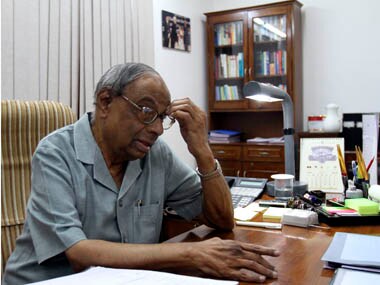The Reserve Bank of India has taken the right policy to check the rupee’s fall without being too aggressive about it, C Rangarajan, chairman of the Prime Minister’s Economic Advisory Council, told CNBC-TV18 in an exclusive interview on Wednesday.
He said the decline in the rupee’s value against the greenback is mainly due to drying capital flows and other fundamental issues like high inflation and a ballooning current account and fiscal deficit. Capital flows are drying because of poor sentiment, which is partly due to the ‘high risk’ perception about the economy amid a growing Greek and larger eurozone crisis. However, he acknowledged that the problems of India’s fiscal/current account deficit and inflation are more fundamental in nature.
[caption id=“attachment_318711” align=“alignleft” width=“380” caption=“Reuters”]
 [/caption]
[/caption]
In such cases, he pointed out that the fall in the rupee cannot be arrested merely by the central bank selling dollars. Given that financial markets have a tendency to over-react and take stances beyond what is justified by economic fundamentals, the RBI is right to step in the financial markets from time to time to check the currency’s fall.
He also said the chances of further active intervention by the RBI cannot be ruled out. If, however, the central bank chose not to intervene, there might be far more adverse effect on the markets, he added.
He also admitted that raising petrol prices were urgently required given the steep fall in the currency and sticky international crude prices. He said the Union Budget for 2012-2013 provided for just Rs 45,000 crore for fuel subsidies, clearly inadequate if prices are not raised. A further push to inflation due to a fuel price hike will be far more manageable than a rising fiscal deficit, he added.
So, should the RBI open a special window for oil importers, given that they are the ones putting the heaviest pressure on demand for dollars?
“It has been done in the past in my time,” said Rangarajan. “But things have changed quite a lot. OMCs’ (oil marketing companies’) demand can be met. But there may be other bulk users who might claim similar privileges and it will be difficult to decide at what rate dollars should be released to OMCs. It is an option that cannot be ruled out, but is has to be used carefully.”
Impact Shorts
More ShortsThe chairman of PMEAC also said he did not with Morgan Stanley’s and CLSA’s estimates of GDP growth of 6.3 percent for the financial year ending March 2013. He insisted that India would still grow by 7 percent this year. Agriculture and services will perform as well as last year, while manufacturing could show partly because of the low base effect of the previous year.
For the moment though, he said it is important for the government to convince investors about India’s growth and enable capital flows to come in, which can revive the currency.
)